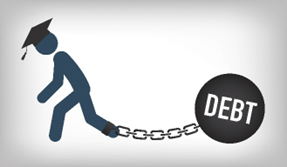 The social loan system
The social loan system
In 2015, a new policy of the Dutch government for student loans and financial aid was implemented: the social loan system (het sociale leenstelsel). It replaced the previous basic grant system (basisbeurs) for higher education, in which all students received a certain amount of money for the nominal duration of their studies. Instead of the basic grant, students now had (the possibility) to borrow money in order to pay for their studies.1,2,3 However, fast-forward to now, the loan system is abolished and the basic grant returned.4 “Since the introduction of the new system, the average debt per student has increased, students increasingly live with their parents for longer periods of time, and financial motives such as loan aversion and high study costs play a role in the decreased flow from mbo to hbo.”5 In short: the social loan system has failed. I was wondering: how did the social loan system work exactly and how do government policies influence student debt accumulation? In this blog you will read more about the social loan system; what it is exactly, why they implemented it, what happened and why they abolished it again.
As I have mentioned before, in 2015 (until 2023) the Dutch government implemented the social loan system. From this moment on, students needed to pay their entire study themselves.1,2,3 They could borrow money from DUO (Dienst Uitvoering Onderwijs) to up to a maximum of €1033 per month.6 Other options to pay for their study were for example working a lot besides their study, or relying on family for financial aid.6,7 When the policy was implemented, the idea was that students could borrow money at no or little interest, and that they had 35 years to pay back their debt. Two years after students obtain their diploma, they start repaying their debt. If, after 35 years, someone does not succeed in paying back the borrowed money, the debt will be cancelled.9 Furthermore, the supplementary grant (aanvullende beurs) for students whose parents have a low income and the arrangement regarding student public transport continued to exist,10 which I will not go into detail about.
So, why did the government chose to implement student lending? There were multiple reasons. First of all, by abolishing the basic grant they saved a lot of money, which would go towards increasing the quality of education, they said.9 Second, they argued that the basic grant was increasing the gap between the richer and the poorer people, since students whose parents had a lot of money received the same monthly amount as students whose parents could not support them financially. By not gifting the money, but lending it, the government thought to decrease this gap.8,9 And finally, we see a neoliberal tendency of placing the responsibility completely on the individual.11,12,13 The government decided that by borrowing money, students would feel more responsibility and see their education and the costs that come with it as an investment in the self.8,9,11,12,13
They thus intended to increase the quality of education and to decrease the gap between the rich and poor.8,9 However, as Zihni Özdil, former GroenLinks member of the parliament, argued; “Only the elite are able to graduate without incurring debt”.14 He said the loan system increases class division. “When you force people to enter the labour market with a huge debt, you’re effectively constraining them. People with heavy debts will take on any job to pay them off, and are much less likely to strike or join a labour union.”14 Furthermore, in a video about the loan system from NOS op3, titled “Wel een studieschuld, amper beter onderwijs” (rough translation: having student debt, but barely better education), they explained that very little money of what was intended to be used was actually used to improve the quality of education; meaning that they thus increased student debt, without significantly improving education.15,16
Other promises were also broken. In 2015, the government stressed that student debt would not have an effect on someone’s ability to get a mortgage, which is not true anymore.9 As Tom, a former student and now debt-owner told me about his struggles with buying a house: “After your study you don’t start at 0, you start with a disadvantage. You get a smaller mortgage because of your debt. And paying it off little by little doesn’t help, you have to pay off the whole amount before you can get a bigger mortgage. So it takes much longer before you can buy a house.” Moreover, interest rates on student debt recently increased drastically. In 2024 students have to pay a five times higher interest rate compared to this year – with the interest rate increasing from 0,46% to 2,56%17 – while the government said that students wouldn’t have to pay interest on their debt when the social loan system was first implemented.3,19

This policy (of course) strongly increases students’ debt accumulation.3,5,9,14,18 It is found that student debt increases every year, and that the general debt of a student is now four thousand euros higher than before the social loan system was implemented, with a general debt of 16 thousand euros in 2022.18
We have also seen that the policy hugely intervenes in people’s financial situation after they graduated; it affects mortgages and people will now pay hundreds of euros extra per year because of increased interest rates.9,17,19 Apart from the financial consequences of this policy, I also want to briefly mention other effects of this policy, since the impact is enormous. People live with their parents for a longer period of time, because they can’t afford to move out14 (which was also true for Tom: “I continued to live at home with my parents. It was much cheaper and I wanted to limit my debt”); students experience lower mental well-being and academic performances because of their debt, or even the fear of accumulating debt3; they experience more stress, tiredness, pressure to work besides their study, depression, and anxiety14 – to just name a few. As you can see, government policies have significant effects on student debt accumulation, as well as students’ overall health and wellbeing.
I think what was silenced or not thought enough about in this policy proposal is that there is a mismatch between students wanting to graduate within the nominal duration of their study (since they have to lend money and it is thus more expensive), while at the same time they want or feel obliged to work more besides their study (in order to be able to pay for it). The two can’t exist together, because if students work more, their academic performances will decrease, which makes them less likely to complete their studies within the nominal duration.3,14,19 As Tom explained: “In my masters, there was just no time to work, I was way too busy studying. So you’re accumulating debt against your will. I worked (i.e. studied) harder that year than you would do working a full-time job. But now I have to pay back my debt. That feels unfair.”
Thus, now that the government was also aware that the social loan system is failing, they brought back the basic grant system where students will receive a certain amount of money for their studies per month (depending on whether you are living with your parents or on your own, and the nominal duration of your study).2,3,4 However, there still exists a whole ‘pechgeneratie’ (‘bad luck generation’ – which is the term used for students who studied during the social loan system) who have huge debts, are faced with higher interest rates than was originally planned, and will only receive a small compensation fee.19 But that is a whole blogpost of its own.

I hope this blogpost provided a clear overview of what the social loan system exactly is, why it was implemented, what was intended, how it did not work out the way they hoped, and thus why now the basic grant system is back. Furthermore, what we have seen is that the policies that are implemented regarding student lending or granting are hugely affecting student debt accumulation. Because of the changes in policies, some students will have huge debts, while others are able to keep it limited due to the basic grant being implemented again. This creates huge inequalities and disadvantages for when people graduate and are ready to get a job, buy a house, or have other future plans. 3,4,5,9,14,18,19
Like Özdil said: “If we as a society decide that education is a basic right, we shouldn’t build in any kind of loan system”.14 I am happy that the basic grant returned and that it will make it easier for future students, but I think more can be done. Let’s not stop thinking and talking about how we want to organize the society we live in. What about free education for all? 🙂
References
- Officiële bekendmakingen overheid (July 1, 2013). Kamerstuk 33680. https://zoek.officielebekendmakingen.nl/kst-33680-3.html
- Pool, J. (2016). Het sociaal leenstelsel: En het effect op de instroom van studenten in het hoger onderwijs. [Thesis, Erasmus University]. Retrieved from http://hdl.handle.net/2105/34863
- Ten Broeke, M. (2022). Exploring bias in the creation and use of evidence in the policy-making process of the loan system in the Netherlands. [Thesis, University of Twente]. Retrieved from http://essay.utwente.nl/91849/
- Rijksoverheid. (2023). Veranderingen studiefinanciering 2023. Retrieved from https://www.rijksoverheid.nl/onderwerpen/hoger-onderwijs/veranderingen-studiefinanciering-2023
- Erasmus University Rotterdam. (July 31, 2020). The social loan system for students influences the choice of studies. Retrieved from https://www.eur.nl/en/news/social-loan-system-students-influences-choice-studies
- CBS – Centraal Bureau voor de Statistiek. (May 18, 2021). Hoe vergaat het studenten in het leenstelsel? Retrieved from https://www.cbs.nl/nl-nl/longread/statistische-trends/2021/hoe-vergaat-het-studenten-in-het-leenstelsel-?onepage=true
- Uitbetaling studiefinanciering. (n.d.). Sociaal leenstelsel: Wat is het sociaal leenstelsel? Retrieved from https://uitbetalingstudiefinanciering.nl/sociaal-leenstelsel/
- Delta Journalistic platform TU Delft. (February 4, 2021). This is how your basic grant died. Retrieved from https://www.delta.tudelft.nl/article/how-your-basic-grant-died#
- NOG – Nationale Onderwijs Gids. (March 17, 2021). Leenstelsel of basisbeurs: Waarom is het leenstelsel een mislukt experiment? Retrieved from https://www.nationaleonderwijsgids.nl/hbo/nieuws/57495-leenstelsel-of-basisbeurs-waarom-is-het-leenstelsel-een-mislukt-experiment.html
- September Advies. (November 10, 2014). Het nieuwe leenstelsel: Wat verandert er voor studenten? Retrieved from https://septemberadvies.nl/het-nieuwe-leenstelsel-wat-verandert-er-voor-studenten/
- Winch, A. (2015). Brand intimacy, female friendship and digital surveillance networks. New Formations, 84, 228-245.
- Tiusanen, K. (2021). Fulfilling the self through food in wellness blogs: Governing the healthy subject. European Journal of Cultural Studies, 24, 1382-1400. https://doi.org/10.1177/13675494211055734
- Rottenberg, C. (2014). The rise of neoliberal feminism. Cultural Studies, 28, 418-437. https://doi.org/10.1080/09502386.2013.857361
- VOX – onafhankelijk magazine van de Radboud Universiteit. (October 15, 2019). Away with the student loan system! But at what cost? Retrieved from https://www.voxweb.nl/english/away-with-the-student-loan-system-but-at-what-cost
- NOS op3. (September 26, 2019). Waar ging het geld van de afschaffing studiebeurs naartoe? Retrieved from https://nos.nl/op3/artikel/2303464-waar-ging-het-geld-van-de-afschaffing-studiebeurs-naartoe
- NOS op3. (September 13, 2019). Wel een studieschuld, amper beter onderwijs [Video]. Youtube. Retrieved from https://www.youtube.com/watch?v=yl8vvGZY1fY
- NJi – Nederlands Jeugdinstituut. (October 11, 2023). Flinke stijging van rente op studieschuld. Retrieved from https://www.nji.nl/nieuws/flinke-stijging-van-rente-op-studieschuld#:~:text=De%20rente%20die%20studenten%20in,overheid%20moet%20betalen%20op%20leningen.
- CBS – Centraal Bureau voor de Statistiek. (September 15, 2022). Studieschuld blijft toenemen. Retrieved from https://www.cbs.nl/nl-nl/nieuws/2022/37/studieschuld-blijft-toenemen
- UKrant.nl. (November 22, 2022). Lenen, schulden, rente en geen hypotheek: De dubbele pech van de pechgeneratie. Retrieved from https://ukrant.nl/magazine/lenen-schulden-rente-en-geen-hypotheek-de-dubbele-pech-van-de-pechgeneratie/